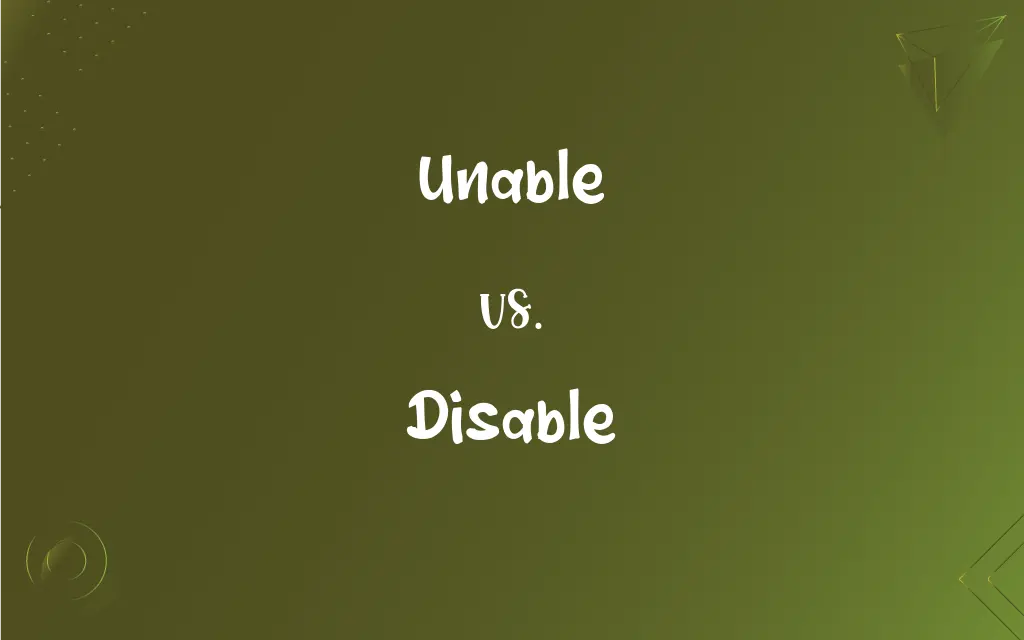Unable vs. Disable: What's the Difference?
Edited by Aimie Carlson || By Janet White || Published on October 22, 2023
"Unable" describes a lack of capability or power to do something, while "disable" means to deactivate or render ineffective.

Key Differences
"Unable" is an adjective that is often employed to highlight a lack of capacity, skill, means, or opportunity. When someone states they are unable, it suggests a current state of incapability, whether it be due to physical constraints, knowledge limits, or external factors. It can be a temporary or permanent condition, but it emphasizes the absence of a certain ability.
On the contrary, "disable" is primarily used as a verb, referring to the action of making something inactive, ineffective, or inoperative. When an item is disabled, it has been intentionally set or forced into a state where it can't function as intended. This could refer to objects, features, or even body parts, signifying that they've been rendered nonfunctional.
Further, "unable" carries an inherent quality of passivity. For instance, when a person is unable to do something, the word doesn't necessarily suggest any deliberate action taken to create that state of inability. It might be a natural circumstance or an inherent limitation. "Unable" simply conveys a fact or state.
In contrast, "disable" is active. When a device or function is disabled, it's often because someone or something took an action to cause that state. Whether a feature on a software platform is turned off, or a machine is deactivated, "disable" insinuates purposeful intervention.
While "unable" and "disable" are distinct in usage and meaning, they can sometimes be contextually related. For example, a disabled device might lead to a user being unable to access certain information. However, each term has its unique context and should be employed appropriately.
ADVERTISEMENT
Comparison Chart
Grammatical Role
Adjective
Primarily used as a verb
Implies Action
No (Passive)
Yes (Active)
Describes
State of incapability
Action of deactivation
Temporality
Can be temporary or permanent
Often a result of an action
Cause
Natural or inherent limitation
Intentional intervention
ADVERTISEMENT
Unable and Disable Definitions
Unable
Lacking the skill, means, or opportunity to do something.
He was unable to complete the task.
Disable
To make a device or system inoperative.
I had to disable the alarm to enter the house.
Unable
Lacking the authority or means to undertake a particular action.
They are unable to provide financial assistance.
Disable
To turn off a function or feature.
You can disable notifications in the settings.
Unable
Not having the requisite knowledge or experience.
I'm unable to answer that question without further information.
Disable
To put out of action or make unfit for use.
The virus could disable the computer's security system.
Unable
Not in a position to achieve something due to external circumstances.
Due to the heavy storm, we were unable to travel.
Disable
To deprive of physical or mental capacities.
The injury could disable him for life.
Unable
Not having the physical strength or health to do something.
She was unable to walk after the accident.
Disable
To render ineffective or powerless.
The software update might disable certain features.
Unable
Lacking the necessary power, authority, or means; not able; incapable
Unable to get to town without a car.
Disable
To deprive of capability or effectiveness, especially to impair the physical abilities of.
Unable
Lacking mental or physical capability or efficiency; incompetent
Unable to walk.
Disable
(Law) To render legally incapable of performing an act.
Unable
Usage Problem Not susceptible to action or treatment
A project unable to be financed with government funds. See Usage Note at able.
Disable
(transitive) To render unable; to take away an ability of, as by crippling.
Unable
Not able; lacking a certain ability.
Are you unable to mind your own business or something?
Disable
To impair the physical or mental abilities of; to cause a serious, permanent injury.
Falling off the horse disabled him.
Unable
(aviation) Indicating that a requested course of action is not possible to carry out.
"November three seven kilo, climb and maintain twelve thousand." "Unable, we have pressurization problems. Maintaining nine thousand."
Disable
To deactivate, to make inoperational (especially of a function of an electronic or mechanical device).
The pilot had to disable the autopilot of his airplane.
Unable
To render unable; to disable.
Disable
(obsolete) Lacking ability; unable.
Unable
Not able; not having sufficient strength, means, knowledge, skill, or the like; impotent; weak; helpless; incapable; - now usually followed by an infinitive or an adverbial phrase; as, unable for work; unable to bear fatigue.
Sapless age and weak unable limbs.
Disable
Lacking ability; unable.
Unable
(usually followed by `to') not having the necessary means or skill or know-how;
Unable to get to town without a car
Unable to obtain funds
Disable
To render unable or incapable; to destroy the force, vigor, or power of action of; to deprive of competent physical or intellectual power; to incapacitate; to disqualify; to make incompetent or unfit for service; to impair.
A Christian's life is a perpetual exercise, a wrestling and warfare, for which sensual pleasure disables him.
And had performed it, if my known offenseHad not disabled me.
I have disabled mine estate.
Unable
(usually followed by `to') lacking necessary physical or mental ability;
Dyslexics are unable to learn to read adequately
The sun was unable to melt enough snow
Disable
To deprive of legal right or qualification; to render legally incapable.
An attainder of the ancestor corrupts the blood, and disables his children to inherit.
Unable
Lacking in power or forcefulness;
An ineffectual ruler
Like an unable phoenix in hot ashes
Disable
To deprive of that which gives value or estimation; to declare lacking in competency; to disparage; to undervalue.
Disable
Make unable to perform a certain action;
Disable this command on your computer
Disable
Injure permanently;
He was disabled in a car accident
FAQs
Is "unable" a verb or an adjective?
"Unable" is an adjective.
Can "disable" be used as a noun?
No, "disable" is primarily a verb. The noun form would be "disability."
Can "unable" describe both temporary and permanent states?
Yes, "unable" can describe both temporary and permanent conditions of incapability.
What's the opposite of "disable"?
The opposite of "disable" is "enable."
If a person is "unable" to hear, does it mean they are "disabled"?
Being "unable" to hear refers to the incapability, while being "disabled" in terms of hearing often refers to a permanent condition, like deafness.
Can something be "disabled" without intervention?
Typically, "disable" suggests purposeful intervention, whereas "unable" doesn't necessarily imply causation.
If a feature is "disabled", can it be said that it is "unable" to work?
While it's more appropriate to say the feature "doesn't work" or "isn't functioning", it can indirectly lead to a user being "unable" to use it.
What does it mean when a software feature is "disabled"?
It means the feature has been turned off or made inactive.
Can "disable" be used metaphorically?
Yes, "disable" can be used metaphorically to mean rendering something ineffective.
Can "disable" be used as an adjective?
Rarely. The adjective form is typically "disabled."
Does "unable" always suggest a lack of power?
Not necessarily. "Unable" can also suggest a lack of skill, opportunity, means, or authority.
Can a person be "disabled" temporarily?
Yes, a person can be "disabled" temporarily, such as after an injury.
Is "unable" always negative?
Generally, "unable" implies a limitation, but context determines if it's seen as negative.
If a feature is "disabled", can it be reactivated?
Typically, yes. If something is "disabled", it can often be "enabled" again.
Does "unable" always imply a lack of skill?
No, "unable" can imply a lack of means, opportunity, health, authority, or other factors.
Can a device be "disabled" unintentionally?
While "disable" often implies intention, unintended factors can also "disable" a device.
Does "unable" mean the same as "incapable"?
While similar, "unable" often implies a current condition, whereas "incapable" might suggest a more inherent limitation.
Can external circumstances make someone "unable"?
Yes, external circumstances can lead to someone being "unable" to do something.
Can "unable" and "disable" be used interchangeably?
No, they serve different grammatical roles and have distinct meanings.
Is "disable" always about physical or technological conditions?
No, "disable" can also refer to making something ineffective or powerless in various contexts.
About Author
Written by
Janet WhiteJanet White has been an esteemed writer and blogger for Difference Wiki. Holding a Master's degree in Science and Medical Journalism from the prestigious Boston University, she has consistently demonstrated her expertise and passion for her field. When she's not immersed in her work, Janet relishes her time exercising, delving into a good book, and cherishing moments with friends and family.
Edited by
Aimie CarlsonAimie Carlson, holding a master's degree in English literature, is a fervent English language enthusiast. She lends her writing talents to Difference Wiki, a prominent website that specializes in comparisons, offering readers insightful analyses that both captivate and inform.






































































